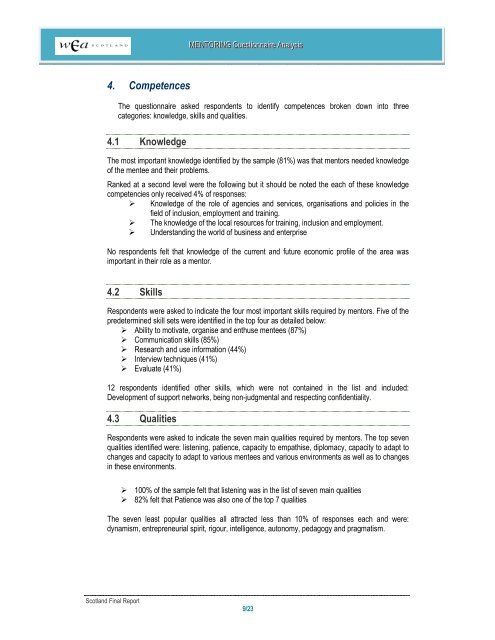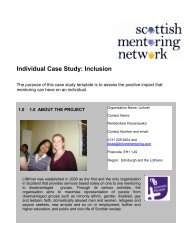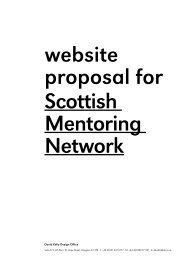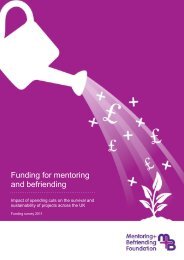MENTORING QUESTIONNAIRE EVALUATION REPORT Answers ...
MENTORING QUESTIONNAIRE EVALUATION REPORT Answers ...
MENTORING QUESTIONNAIRE EVALUATION REPORT Answers ...
You also want an ePaper? Increase the reach of your titles
YUMPU automatically turns print PDFs into web optimized ePapers that Google loves.
MEENNTTORRI IINNG Quueesst tti iioonnnnaai iir ree AAnnaal llyyssi iiss<br />
4. Competences<br />
The questionnaire asked respondents to identify competences broken down into three<br />
categories: knowledge, skills and qualities.<br />
4.1 Knowledge<br />
The most important knowledge identified by the sample (81%) was that mentors needed knowledge<br />
of the mentee and their problems.<br />
Ranked at a second level were the following but it should be noted the each of these knowledge<br />
competencies only received 4% of responses:<br />
Knowledge of the role of agencies and services, organisations and policies in the<br />
field of inclusion, employment and training.<br />
The knowledge of the local resources for training, inclusion and employment.<br />
Understanding the world of business and enterprise<br />
No respondents felt that knowledge of the current and future economic profile of the area was<br />
important in their role as a mentor.<br />
4.2 Skills<br />
Respondents were asked to indicate the four most important skills required by mentors. Five of the<br />
predetermined skill sets were identified in the top four as detailed below:<br />
Ability to motivate, organise and enthuse mentees (87%)<br />
Communication skills (85%)<br />
Research and use information (44%)<br />
Interview techniques (41%)<br />
Evaluate (41%)<br />
12 respondents identified other skills, which were not contained in the list and included:<br />
Development of support networks, being non-judgmental and respecting confidentiality.<br />
4.3 Qualities<br />
Respondents were asked to indicate the seven main qualities required by mentors. The top seven<br />
qualities identified were: listening, patience, capacity to empathise, diplomacy, capacity to adapt to<br />
changes and capacity to adapt to various mentees and various environments as well as to changes<br />
in these environments.<br />
100% of the sample felt that listening was in the list of seven main qualities<br />
82% felt that Patience was also one of the top 7 qualities<br />
The seven least popular qualities all attracted less than 10% of responses each and were:<br />
dynamism, entrepreneurial spirit, rigour, intelligence, autonomy, pedagogy and pragmatism.<br />
Scotland Final Report<br />
9/23






